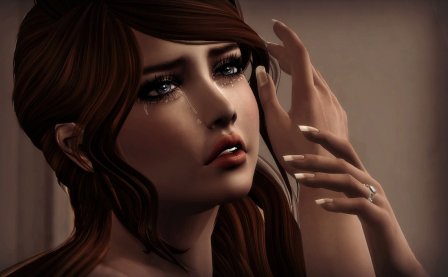Look, for a moment, at the cover of this record. Really look at it. Wearing a yellow blouse and set against an orange backdrop, Annie Clark (a.k.a. St. Vincent) stares off into the distance, looking like a porcelain doll or a Stepford Wife. Her eyes exude simultaneous feelings of disappointment, boredom, and longing, and her lips are pursed either to hold back words or as a quiet display of stoicism. Ultimately, though, her placid, naïve physiognomy seems to belie an aggression that roils beneath a smooth surface, and it’s a perfect representation of Actor’s music: it looks like she's acting.
Early standout “The Neighbors” best displays how well St. Vincent marries form and content. Clark questions, softly and smoothly, "What would your mother say?/ What would your father do?/ What would the neighbors think?/ If they only knew?” Each question, set against what sounds like a warped ’50s TV show soundtrack, is punctuated with bursts of furiously strummed distorted guitar. Finally, in the third verse, she breaks free from restraint and sings with conviction until her melody is swallowed up in a wall of distorted guitar. On “The Strangers,” a flute melody spirals downward while ticking percussion falls in and out of sync with the rest of the song, mimicking the instability of the relationships she deals with here and throughout the album (“Playboys beneath the mattress/like I wouldn’t notice”). She’s not a submissive, mundane housewife-type, and she’s making it known.
Unease pervades the rest of the album, as if the mannequin-like cover image wasn’t convincing enough. On “Black Rainbow,” Clark details a surreal suburbia where children “act like furniture” for their mothers and have “back pockets full of dynamite.” “The Bed” tells of chalk outlines and scaring monsters from under the bed with “Daddy’s Smith & Wesson.” Clark’s sweet vocals carry a tinge of malice, and set against the fanciful, dreamy arrangements, they often recall a golden-era Disney-villain.
Although she’s quite adept at guitar, Clark’s primary instrument is featured less here than it was on Marry Me. Her nuanced playing on that album included delicate harmonic patterns, complex fret workouts, and noisy, dissonant releases, often within the same song (“Now, Now”). She still evidences her considerable skill on this album (the searing leads on “Marrow” or the fingerpicked pattern in the chorus of “Laughing With a Mouth of Blood”), but she often allows the thoughtful orchestration and piano to take the lead. “Marrow”’s guitar riffs share the spotlight with distorted saxophone and a club-ready beat that sounds like it was lifted from a Justice track, and the climax of “The Party” is delivered with sweeping orchestration and percussion similar to that on Elliott Smith’s later albums.
St. Vincent trades in subversion and does so exceptionally well on Actor. Just as she sang on Marry Me’s “Now, Now,” she’s “not your mother’s favorite dog,” somebody willing to conform to expectations. Annie Clark possesses a talent far beyond those of many of her contemporaries and clearly isn't just another girl-with-a-guitar singer/songwriter. While Actor’s best moments may not reach the same high points as Marry Me's, it’s an even more cohesive effort, and one that I haven’t tired of after countless listens.
1. The Strangers
2. Save Me From What I Want
3. Neighbors
4. Actor Out of Work
5. Black Rainbow
6. Laughing With a Mouth of Blood
7. Marrow
8. The Bed
9. The Party
10. Just the Same But Brand New
11. The Sequel
More about: St. Vincent




